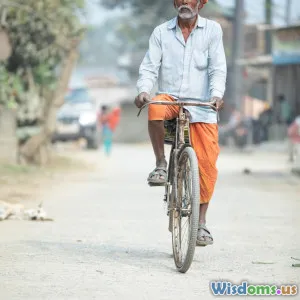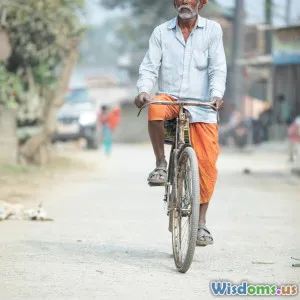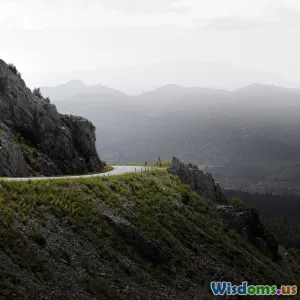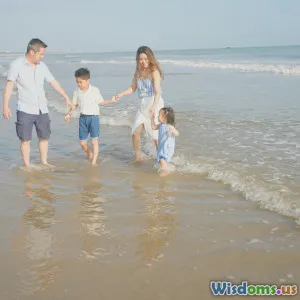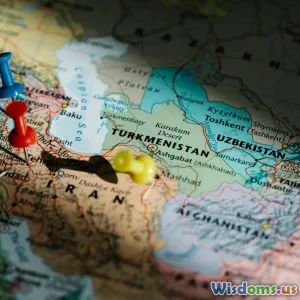
Unexpected Benefits of Getting Lost While Traveling Alone
8 min read Discover the transformative, unexpected benefits of getting lost during solo travel that enrich your journey in surprising ways. (0 Reviews)
Unexpected Benefits of Getting Lost While Traveling Alone
Traveling alone is often portrayed as a path paved with meticulous planning, fixed itineraries, and stringent schedules designed to avoid missteps. Yet, some of the most transformative, memorable, and enriching moments stem from those moments when you lose your way—literally. Getting lost while traveling solo can seem frightening or inconvenient initially, but it harbors unexpected benefits that deeply enhance your personal journey and transformation.
Introduction: The Beauty of Being Lost
Imagine stepping off a beaten path into the labyrinthine streets of an ancient city without a map or GPS signal, your heart pounding with uncertainty and excitement. For many solo travelers, this fear of the unknown often becomes a reluctance to embrace detours or unexpected experiences. But what if losing your way isn’t a mishap, but a critical ingredient to a richer travel experience?
This article unpacks how getting lost during solo travel becomes an opportunity for growth, creativity, cultural immersion, and self-discovery. These benefits are more than just feel-good anecdotes—they are supported by experts, travel veterans, and even neuroscience.
1. Cultivating Resilience and Confidence
Getting lost forces you into problem-solving mode, often requiring quick thinking and calm under pressure. When alone, the challenge intensifies, prompting the traveler to build resilience and self-reliance.
Case in Point: Jessica Nabongo, the first widely recognized Black woman to have visited every country in the world, frequently recounts how unplanned wanderings and accidental detours bolstered her confidence. Being lost alone taught her to trust her instincts and make smart decisions independently, skills that proved invaluable both on and off the road.
From a psychological perspective, according to a 2017 study published in the Journal of Experiential Psychology, confronting uncertainty and disorientation helps enhance cognitive flexibility—the ability to adapt to new and unexpected conditions.
2. Sparks Creativity and Mindfulness
Stepping into unfamiliar spaces without directions heightens your sensory awareness: noticing unfamiliar sounds, smells, architectural details, and interactions. This sensory activation can ignite creativity.
Famous creative figures like Albert Einstein famously credited the act of wandering without a fixed destination as crucial to their imaginative processes. Solo travelers report similar effects—getting lost invites spontaneous discovery, opens the mind to novel experiences, and triggers creative thoughts.
Mindfulness also naturally blossoms as lost travelers tune into their immediate environment to navigate and feel grounded. A Mindfulness Journal survey noted that travelers who engaged deeply with unexpected situations reported enhanced feelings of present-moment awareness and reduced anxiety.
3. Deeper Cultural Immersion and Connection
A lost traveler stepping off tourist routes often stumbles upon hidden gems and authentically local experiences unattainable through usual channels.
Example: In Kyoto’s maze-like Gion district, several solo travelers have shared how losing their way led them to family-run traditional tea houses, intimate performances, and unexpected conversations with local artisans—moments that are rarely featured in travel guides.
This type of immersion nurtures genuine cultural understanding instead of a surface-level glance. Americans academic Dr. Lisa Smith emphasizes that “the detours we resist often lead to the richest intercultural connections because they force us to rely on human interaction, not just technology.” These interactions foster empathy and global awareness.
4. Opportunities for Serendipity and Adventure
Travel narratives worldwide celebrate serendipity—those chance encounters and discoveries marking the travel experience. Getting lost is fertile ground for serendipity.
Historian Paul Theroux reflected in his memoirs that his most treasured stories happened precisely when he abandoned plans and embraced the uncertainty of being lost. This attitude led him down quiet country roads where he met storytellers, musicians, and strangers who became lifelong friends.
Take the example of solo traveler Sofia Martins who, after missing a train in Portugal, wandered into a local village festival. This unplanned event introduced her to regional cuisine, dance, and customs far beyond the typical tourist radar.
5. Enhances Problem-Solving and Decision-Making Skills
Being lost calls for active navigational decision-making—whether decoding street signs, asking locals, or adapting plans on the fly.
Neuroscientific research indicates that spatial navigation involves complex cognitive functions: memory, attention, and decision-making. By repeatedly navigating unfamiliar environments without assistance, solo travelers hone mental skills that have lasting benefits across life domains.
London’s renowned psychologist Dr. Aaron Hampton states, “Learning how to ‘read’ new environments under pressure sharpens attention and logic, competencies essential for success in any endeavor.” Practicing navigation under uncertainty cultivates a growth mindset—viewing challenges as opportunities to improve.
6. Building Stories and Confidence to Share
Experiencing and reflecting on times when you’re lost alone invariably yields compelling stories—moments of tension, vulnerability, insight, and triumph. These narratives not only enrich your memory bank but also connect you deeply to others through shared human experience.
Studies show storytelling solidifies personal identity and boosts public speaking skills, both powerful in professional and personal contexts. Travel blogger Michael Roberts describes getting lost solo as “the origin story for my most engaging tales, which always inspire others to step outside comfort zones.”
Practical Tips to Embrace the Experience of Getting Lost
- Prepare With Minimalism: Have basic tools like a paper map or downloaded offline maps, but resist over-planning.
- Keep Safety First: Trust your intuition. If a situation feels unsafe, retrace or seek help.
- Engage Locals: Initiate conversations to navigate and learn culturally.
- Stay Curious, Not Anxious: Reframe adversity as an opportunity.
- Reflect: Keep a travel journal to capture experiences and insights.
Conclusion: The Serendipitous Gift of Being Unmoored
Though potentially anxiety-inducing at first, getting lost alone while traveling unlocks invaluable benefits—building resilience, sparking creativity, deepening cultural connection, and developing crucial cognitive skills. Embracing the unknown fuels personal growth and produces unforgettable stories.
Next time your GPS fails or you find yourself on a strange path, lean into the experience. You might find the detour was exactly where you were meant to be all along.
Travel beyond maps, and let losing explore what it means to truly find yourself.
Rate the Post
User Reviews
Popular Posts











